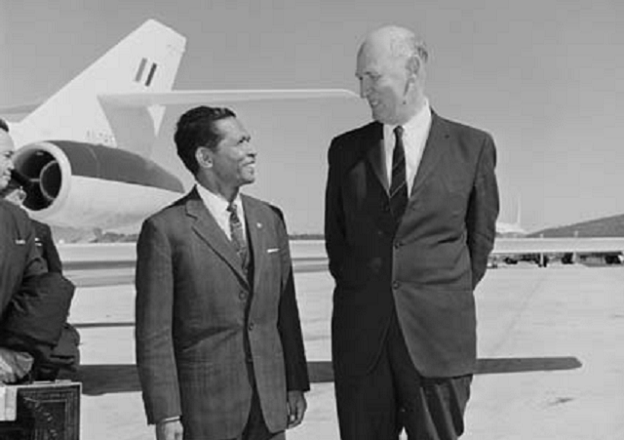Sir James Plimsoll: a diplomatic strategist or a strategic diplomat?
Posted By Allan Behm on May 8, 2015 @ 11:00
Sir James Plimsoll was a strategist. While his illustrious foreign service career might suggest that he was more an implementer than a crafter of policy, those of us who were privileged to see him at work knew that his fingerprints were as much on the design of policy as they were on its execution.
Plimsoll’s entire approach to foreign policy was strategic: he focused on the correlation of ends and means, and saw all policy as directed at Australia’s security, prosperity and international reputation. Like Sir Arthur Tange, Plimsoll didn’t distinguish in any fundamental way between security policy and foreign policy. To him, they were but different contributions to the same objective—the protection and promotion of Australia’s interests.
Jeremy Hearder’s recently published biography Jim Plim: Ambassador Extraordinary chronicles Plimsoll’s life in detail, from his childhood in post World War I Bondi to his death in the Governor’s residence in Hobart.
As it moves through the key appointments of Plimsoll’s career—including a period as Secretary of the Department of External Affairs—it demonstrates that a fine brain and honed diplomatic skills are essential to the delivery of foreign policy outcomes that advance the national interest. But the biography is less successful in bringing to life Plimsoll’s engaging if somewhat introverted personality. Rather, it leaves the reader with the impression that Plimsoll lived only for his work.
Plimsoll was amusing, generous and entertaining, with a dry and somewhat laconic wit. And he possessed an elegant mind. To work with him on the preparation of a speech for an international negotiating committee was a tutorial on both policymaking and diplomacy. He had a seemingly endless supply of used envelopes, all carefully slit open so that he could plan and draft his speaking notes without wasting paper. His legendary frugality was inversely proportionate to the brilliance and clarity of his exposition.
He’d always begin his planning with a discussion of what the government was trying to achieve, and what principles were at play in achieving the outcome. He’d then examine the positions of other parties, identifying the common ground, the room for manoeuvre and the sticking points. He had an uncanny instinct for the relationship between intransigence and ego, and was shrewd in assessing the personalities of his protagonists: their vanity, personal foibles and points of weakness.
In the Committee on Disarmament, for instance, he was able to win significantly greater concessions from the Soviet ambassador Victor Issraelyan (a member of the praesidium of the Foreign Ministry and an avowed atheist) than the rambunctious US ambassador Adrian Fisher was ever able to do. How? By discussing the prospects of an afterlife with Issraelyan following the latter’s near-death experience thanks to a coronary infarct—a conversation evincing both humanity and subtle humour.
He only spoke from notes, never from a prepared text. His notes were always hand-written, and his presentation was clear, simple, unadorned and completely ad rem. He listened carefully to the advice put to him by the staff, and paid close attention to the ‘instructions’ sent to him by Canberra. But he always molded the ‘instructions’ to the situation and crafted his own argument, focusing on the possible rather than the desirable. Yet he made no significant concessions.
His pursuit of common ground and consensus led to his being accused of suffering ‘localitis’ by some of his less intellectually-gifted peers in External Affairs. He had, for example, enormous respect for the stoic endurance of the Russian peasants, not only under communism, but also under the autocrats who have traditionally ruled Russia. His ability to engage at the human level generated significant levels of trust, thereby allowing him to deliver Australian (and, frequently, allied) policy objectives in a climate of much greater receptivity and effect than his ambassadorial colleagues were able to generate. But his respect for the Russian people never translated into respect for Soviet policy.
He had a strong sense of Australia’s diplomatic history. During his visits to Geneva as head of our disarmament delegation, he insisted on staying at the Hotel de la Paix —not because it fronted onto Lake Geneva but because that was where the Australian delegation stayed during the League of Nations negotiations following WWI.
Plimsoll was a strong and privately excoriating critic of a number of Australia’s Prime Ministers, senior Ministers and senior public servants. Notwithstanding his personal political preference for the conservative side of politics, he worked effectively with Labor Prime Ministers in the immediate aftermath of WWII, and particularly with the erratic Foreign Minister, Doc Evatt. But, curiously, he saved his greatest criticism for the conservative leaders, particularly McMahon, whom he described as one of the most stupid people he’d ever met.
Nor did he have much respect for Fraser, whose views on the Soviet Union he regarded as naïve, ideological and lacking in subtlety—a view compounded by Fraser’s ham-fisted appointment of Victor Garland as High Commissioner in London, pushing Plimsoll out after only seven months. But when I last met Plimsoll in Hobart in 1986, his attitude had mellowed. He had no animus against Fraser, wryly excusing his innocence on matters of strategic policy as an artefact of the triumph of politics over policy. And for Plimsoll, policy was the only thing that really mattered.
Article printed from The Strategist: https://aspistrategist.ru
URL to article: /sir-james-plimsoll-a-diplomatic-strategist-or-a-strategic-diplomat/
URLs in this post:
[1] Image: https://aspistrategist.ru/wp-content/uploads/2015/05/plimsoll-1.png
Click here to print.
